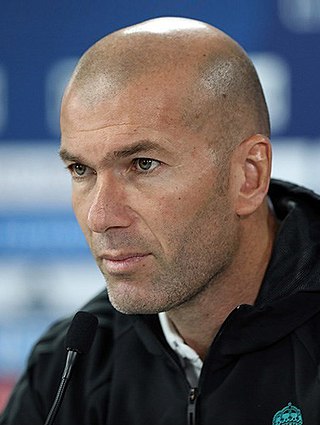
Zinedine Yazid Zidane, popularly known as Zizou, is a French professional football manager and former player who played as an attacking midfielder. He most recently coached Spanish club Real Madrid and is one of the most successful coaches in the world. Widely regarded as one of the greatest players of all time, Zidane was a playmaker renowned for his elegance, vision, passing, ball control, and technique. He received many individual accolades as a player, including being named FIFA World Player of the Year in 1998, 2000 and 2003, and winning the 1998 Ballon d'Or.
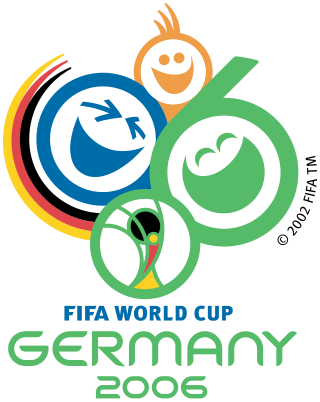
The 2006 FIFA World Cup was the 18th FIFA World Cup, the quadrennial international football world championship tournament. It was held from 9 June to 9 July 2006 in Germany, which had won the right to host the event in July 2000. Teams representing 198 national football associations from all six populated continents participated in the qualification process which began in September 2003. Thirty-one teams qualified from this process along with hosts Germany for the finals tournament. It was the second time that Germany staged the competition and the first as a unified country along with the former East Germany with Leipzig as a host city, and the 10th time that the tournament was held in Europe.

A headbutt or butt is a targeted strike with the head, typically involving the use of robust parts of the headbutter's cranium as the area of impact. The most effective headbutts strike the most sensitive areas of an opponent, such as the nose, using the stronger bones in the forehead or the back of the skull. The word is both a noun and a verb.
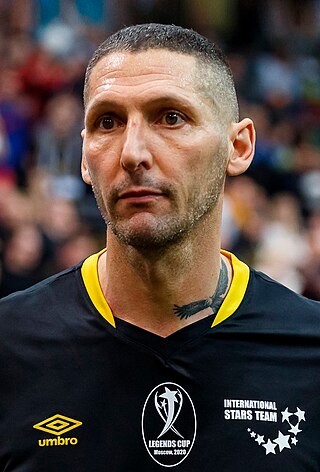
Marco Materazzi is an Italian former professional footballer and manager.

The France–Italy football rivalry is a football rivalry between the national football teams of Italy and France, having achieved six FIFA World Cups and four UEFA European Championships between the two countries. Italy has won four FIFA World Cups in 1934, 1938, 1982, and 2006, while France has won two FIFA World Cups in 1998 and 2018.

Horacio Marcelo Elizondo is an Argentine former international football referee best known for his officiation throughout the 2006 FIFA World Cup. Having achieved all his goals in refereeing, Elizondo retired after the December 2006 match between Boca Juniors and Lanús, 2 years before the compulsory retirement age of 45.
Match officials for the 2006 FIFA World Cup were nominated by the six confederations to FIFA, who, after a series of tests in Frankfurt/Neu-Isenburg in March 2006, selected 23 referees and a support and development group of a further 5, from a shortlist of 44.

Frank De Bleeckere is a Belgian former football referee. He had been a referee since 1984, and an international (FIFA) official since 1998. De Bleeckere refereed in his first World Cup finals in Germany, and had to pass a late fitness test following injury. He had been appointed by UEFA as one of twelve referees to officiate UEFA Euro 2008 matches, and was in charge of the semi-final between Spain and Russia.
Jorge Luis Larrionda Pietrafesa is a retired FIFA football referee from Uruguay who has officiated at international matches since 1998. He officiated at the 2006 FIFA World Cup, where he took charge of four matches, including a semifinal between Portugal and France. He is known as a strict referee who shows a high number of cards.
Benito Armando Archundia Téllez is a Mexican former football referee. He is known in Mexico as Armando Archundia, but appears as Benito Archundia in FIFA records. He has been a professional referee since 1985 and has had his FIFA referee permission since 1993. His first fixture as an international referee was the 1994 match between USA and Greece.
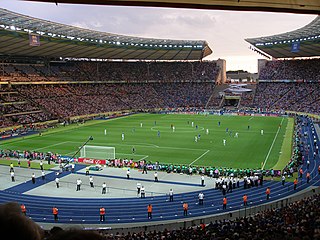
The 2006 FIFA World Cup final was the final match of the 2006 World Cup, the 18th edition of FIFA's competition for national football teams. The match was played at the Olympiastadion in Berlin, Germany, on 9 July 2006, and was contested between Italy and France. The event comprised hosts Germany and 31 other teams who emerged from the qualification phase, organised by the six FIFA confederations. The 32 teams competed in a group stage, from which 16 teams qualified for the knockout stage. En route to the final, Italy finished first in Group E, with two wins and a draw, after which they defeated Australia in the round of 16, Ukraine in the quarter-final and Germany 2–0, in the semi-final. France finished runner-up of Group G with one win and two draws, before defeating Spain in the round of 16, Brazil in the quarter-final and Portugal 1–0 in the semi-final. The final was witnessed by 69,000 spectators in the stadium, with the referee for the match being Horacio Elizondo from Argentina.
The knockout stage was the second and final stage of the 2006 FIFA World Cup, following the group stage. The top two teams from each group advance to the knockout stage to compete in a single-elimination style tournament. A match was played between the two losing teams of the semi-finals to determine which team finished in third place.

Manuel Enrique Mejuto González is a Spanish former football referee. He is best known for refereeing the 2005 UEFA Champions League Final between Liverpool and Milan. He also officiated two matches in the Euro 2004 in Portugal. In European club competition, he has refereed three UEFA Cup matches and thirty-seven UEFA Champions League matches in his career.

The UEFA Euro 2000 final was the final match of Euro 2000, the eleventh European Football Championship, UEFA's top football competition for national teams. The match was played at De Kuip in Rotterdam, the Netherlands, on 2 July 2000 and was contested between France and Italy. France were drawn in Group D alongside the Netherlands, Denmark and the Czech Republic. France ended the group stage as runners-up to the Netherlands, and defeated Spain in the quarter-finals before progressing to the final with a victory over Portugal in the semi-final after a golden goal from Zinedine Zidane. Italy were allocated to Group B alongside Turkey, Belgium and Sweden and won the group. In the quarter-final they defeated Romania before a semi-final penalty shoot-out victory over the Netherlands saw them progress to the final.
The 2006 FIFA World Cup qualification UEFA Group 5 was a UEFA qualifying group for the 2006 FIFA World Cup. The group comprised Belarus, Italy, Moldova, Norway, Scotland and Slovenia.
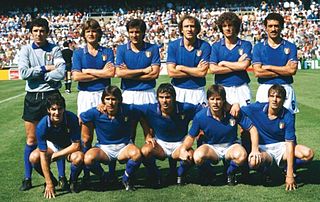
This is a record of Italy's results at the FIFA World Cup. Italy is one of the most successful national teams in the history of the World Cup, having won four titles, just one fewer than Brazil. The team was present in 18 out of the 22 tournaments, reaching six finals, a third place and a fourth place.
Alfonso Pérez Burrull is a Spanish association football referee is a former referee who officiated in the La Liga. He has been officiating since 1997, made his international debut in 2009 and retired in 2010.

Kateryna Volodymyrivna Monzul is a Ukrainian football referee.
The official history of the Italy national football team began in 1910, when Italy played its first international match. Since then, the Italy national team has been one of the most successful football teams, winning four World Cups and two European Championships.












